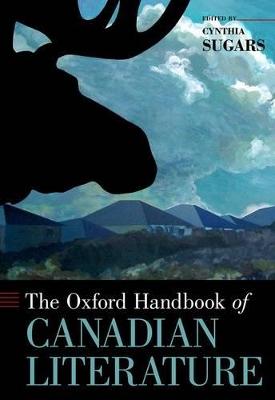Oxford Handbooks
1 total work
The Oxford Handbook of Canadian Literature provides a broad-ranging introduction to some of the key critical fields, genres, and periods in Canadian literary studies. The essays in this volume, written by prominent theorists in the field, reflect the plurality of critical perspectives, regional and historical specializations, and theoretical positions that constitute the field of Canadian literary criticism across a range of genres and historical periods.
The volume provides a dynamic introduction to current areas of critical interest, including (1) attention to the links between the literary and the public sphere, encompassing such topics as neoliberalism, trauma and memory, citizenship, material culture, literary prizes, disability studies, literature and
history, digital cultures, globalization studies, and environmentalism or ecocriticism; (2) interest in Indigenous literatures and settler-Indigenous relations; (3) attention to multiple diasporic and postcolonial contexts within Canada; (4) interest in the institutionalization of Canadian literature as a discipline; (5) a turn towards book history and literary history, with a renewed interest in early Canadian literature; (6) a growing interest in articulating the affective character of the
"literary" - including an interest in affect theory, mourning, melancholy, haunting, memory, and autobiography. The book represents a diverse array of interests — from the revival of early Canadian writing, to the continued interest in Indigenous, regional, and diasporic traditions, to more recent
discussions of globalization, market forces, and neoliberalism. It includes a distinct section dedicated to Indigenous literatures and traditions, as well as a section that reflects on the discipline of Canadian literature as a whole.
The volume provides a dynamic introduction to current areas of critical interest, including (1) attention to the links between the literary and the public sphere, encompassing such topics as neoliberalism, trauma and memory, citizenship, material culture, literary prizes, disability studies, literature and
history, digital cultures, globalization studies, and environmentalism or ecocriticism; (2) interest in Indigenous literatures and settler-Indigenous relations; (3) attention to multiple diasporic and postcolonial contexts within Canada; (4) interest in the institutionalization of Canadian literature as a discipline; (5) a turn towards book history and literary history, with a renewed interest in early Canadian literature; (6) a growing interest in articulating the affective character of the
"literary" - including an interest in affect theory, mourning, melancholy, haunting, memory, and autobiography. The book represents a diverse array of interests — from the revival of early Canadian writing, to the continued interest in Indigenous, regional, and diasporic traditions, to more recent
discussions of globalization, market forces, and neoliberalism. It includes a distinct section dedicated to Indigenous literatures and traditions, as well as a section that reflects on the discipline of Canadian literature as a whole.
